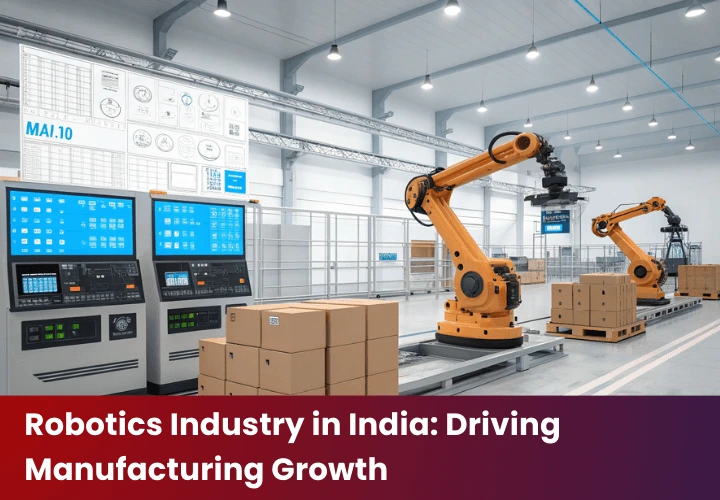
Technological advancements have transformed the way industries operate globally, and India is no exception. The robotics industry in India has been a significant contributor to this change, transforming traditional industries through the use of smart automation. This blog explores how robotics is driving and transforming the manufacturing industry of India
Overview of the Robotics Industry in India
The Indian robotics industry has experienced significant growth over the last decade. The industry is rapidly emerging as one of the world’s leaders in robotics and automation solutions, driven by increased investment, government initiatives such as Make in India, and a growing demand for automation.
As domestic and international players enter the market, an increasing number of companies specialising in industrial, service, and collaborative robots are being developed in India. Industry reports indicate that the robotics market in India is poised for substantial growth over the coming years.
Why Robotics Is Transforming Manufacturing in India
The use of robotics is not just bringing about a technological change but also a cultural and operational change in the way sectors operate. Industrial automation in India is reducing human reliance on repetitive and high-risk jobs, minimising errors, and enhancing overall productivity.
Robotics also enables manufacturers to meet the international production standards required in industries such as automotive, electronics, pharmaceuticals, and heavy engineering. With the introduction of smart robots in production lines, businesses can achieve shorter turnaround times and increased flexibility to tailor production to the market requirements.
Applications of Robotics in Indian Manufacturing
Multiple applications of robotics in India continue to grow with technological advancements.
The most common uses are:
- The automobile industry: Robots are widely used in welding, painting, and assembling car components due to their accuracy and safety.
- Electronics and electricals: Robotics make the assembly of electronic parts more accurate by reducing errors in the manufacturing of micro-scale products.
- Pharmaceuticals and healthcare: Automated systems guarantee compliance with the high-quality standards, while also speeding up drug manufacturing and packaging.
- Heavy industries: Robots perform activities like cutting metals, transporting materials, and inspecting them very efficiently.
- Food and beverages: It assists with packaging, labelling, and quality control, ensuring hygiene and consistency.
Top Robotics Companies and Manufacturers in India
Multiple robot manufacturers in India have stepped up to fulfil the increasing demand for automation and are thus helping the country progress technologically. Leading companies such as Delta Stark have come up with local solutions for Indian manufacturing requirements. In addition to these, they have also established a strong presence in India with their advanced robotics systems.
Together with the Government aid, Delta Stark is bringing cutting-edge automation to Indian manufacturers so that small and medium enterprises (SMEs) can affordably adopt robotics.
Challenges Facing the Robotics Industry in India
Although robot manufacturers have performed remarkably in terms of growth, they still face a number of challenges. A significant barrier for most small and medium-sized industries is high start-up costs. Also, India lacks the availability of skilled labour trained in robotic operation and maintenance, hindering the wide use.
The other obstacle is the lack of awareness of the long-term advantages of robots among manufacturers, leading to slower adoption rates in certain industries. There are also infrastructure and research gaps that need to be addressed to ensure that India becomes a global leader in robotics innovation.
The Future of Robotics in India’s Manufacturing Sector
Industrial automation has a promising future in India, with the rising demand for robotics in industries. The government’s focus on Industry 4.0, along with the development of technologies like artificial intelligence, the Internet of Things (IoT) and machine learning, is contributing to the faster adoption rate of robotics.
Collaborative robots (cobots), robots that work together with humans, will become more popular in the coming years, particularly in SMEs. The innovations make sure that automation is affordable and flexible for all industries. The robotics industry will be important in ensuring that manufacturing is globally competitive by filling in the cost-efficiency gap.
Conclusion
The robotics industry in India is no longer a futuristic concept; it has already started transforming the manufacturing ecosystem in the country. Robotics is helping Indian manufacturers address some of their most pressing issues by reducing costs and enhancing precision and scalability.
With the increased automation of industries in India, new opportunities will be unlocked, global competitiveness will be enhanced, and India will become a leader in advanced manufacturing solutions.
